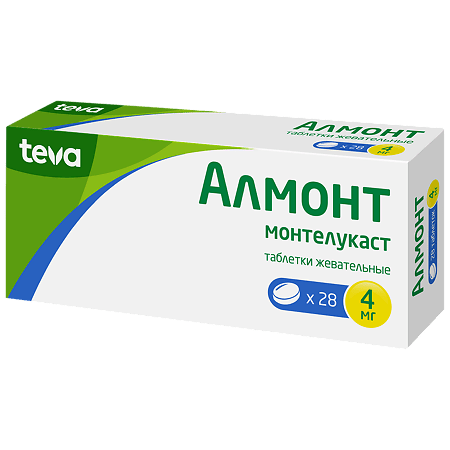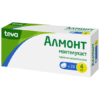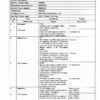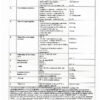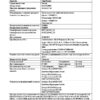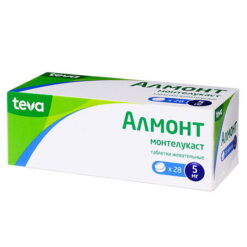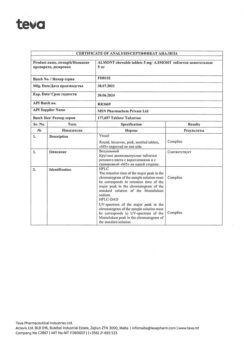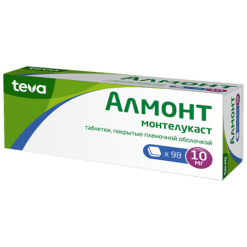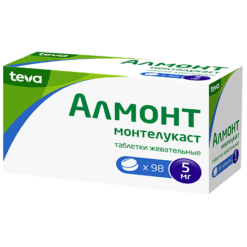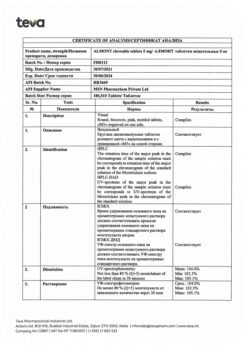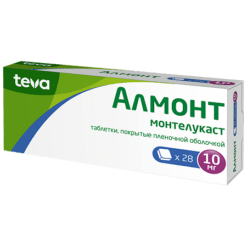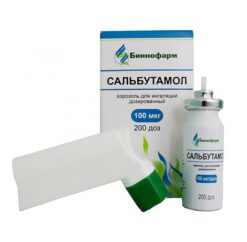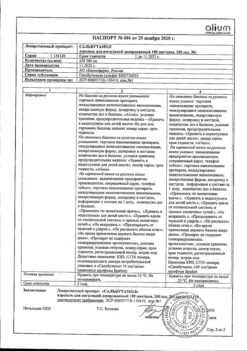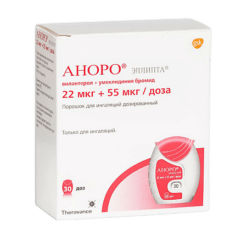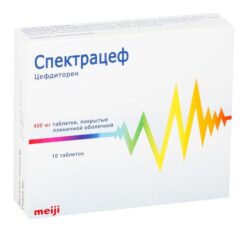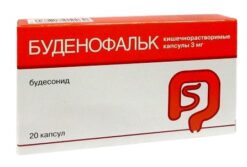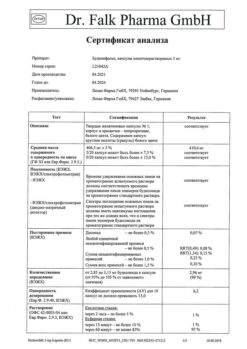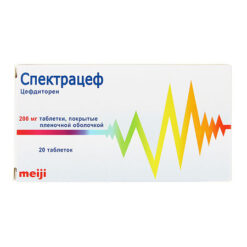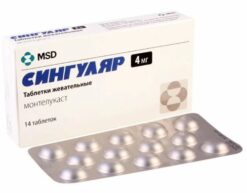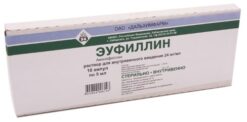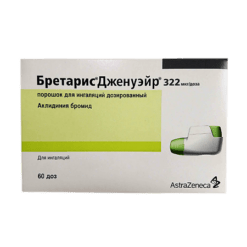No products in the cart.
Almont, 4 mg 28 pcs.
€27.51 €22.93
Description
Bronchospasm, Bronchial asthma, Runny nose (rhinitis)
Prevention and long-term treatment of bronchial asthma in children, including:
- preventing daytime and nighttime symptoms of the disease (for children 2 years and older);
- Treatment of bronchial asthma in patients with hypersensitivity to acetylsalicylic acid (for children 6 years and older);
- preventing exercise-induced bronchospasm (for children 2 years and older).
Promotion of symptoms of seasonal and year-round allergic rhinitis in children from 2 years of age.
Active ingredient
Active ingredient
Composition
Composition
How to take, the dosage
How to take, the dosage
Interaction
Interaction
Special Instructions
Special Instructions
Almont is not recommended for the treatment of acute attacks of bronchial asthma. Patients with bronchial asthma are recommended to have emergency medications with them at all times. When an acute attack occurs, short-acting inhaled beta-adrenomimetics should be used. Patients should consult their physician as soon as possible if they need more short-acting inhaled beta-adrenomimetics than usual.
Almont should not be abruptly replaced with inhaled or oral GCS therapy. There is no evidence to support the possibility of reducing the dose of oral GCS with concomitant administration of montelukast.
In rare cases, patients who receive anti-asthmatic drugs, including montelukast, may develop systemic eosinophilia, sometimes accompanied by clinical signs of vasculitis, the so-called Churg-Strauss syndrome, a condition that is treated by taking systemic GCS. These cases are usually associated with dose reduction or withdrawal of oral GCS therapy. The possibility that leukotriene receptor antagonists may be associated with the development of Charge-Stross syndrome cannot be excluded or established.
Physicians should therefore be alerted to the possibility of eosinophilia, vascular rash, increased severity of pulmonary symptoms, cardiac complications, and/or neuropathy in patients. Patients who have developed the above symptoms should be reevaluated and their treatment regimen reconsidered. Treatment with Almont does not prevent bronchospasm in patients with hypersensitivity to acetylsalicylic acid when using acetylsalicylic acid and other non-steroidal anti-inflammatory drugs.
Almont contains aspartame, a source of phenylalanine. This drug may be harmful to patients with phenylketonuria.
The product contains lactose monohydrate, and should not be used in patients with rare inherited conditions: galactose intolerance, lactase deficiency, or glucose-galactose malabsorption.
Impact on driving and operating machinery
In general, montelukast does not affect the ability to drive vehicles or operate other mechanisms, but very rarely some patients have reported drowsiness and dizziness; if these symptoms occur, patients should not drive vehicles or engage in other activities that require concentration and rapid psychomotor reactions.
Contraindications
Contraindications
Side effects
Side effects
Overdose
Overdose
Symptoms of drug overdose in patients with chronic bronchial asthma when administered at a dose greater than 200 mg daily for 22 weeks and at a dose of 900 mg daily for 1 week have not been identified.
There have been reports of acute overdose of montelukast (when administered at least 1 g per day) in the post-marketing period and in clinical trials in adults and children.
The clinical and laboratory data in this case suggest that the safety profile of the drug in children, adults and elderly patients is consistent. The most frequent symptoms were feeling of thirst, drowsiness, vomiting, psychomotor agitation, headache and abdominal pain. Treatment: administration of symptomatic therapy.
Similarities
Similarities
Additional information
| Shelf life | 3 years |
|---|---|
| Conditions of storage | In a dry, light-protected place at a temperature not exceeding 30 ºC. |
| Manufacturer | Iceland |
| Medication form | chewable tablets |
Other forms…
Related products
Buy Almont, 4 mg 28 pcs. with delivery to USA, UK, Europe and over 120 other countries.

